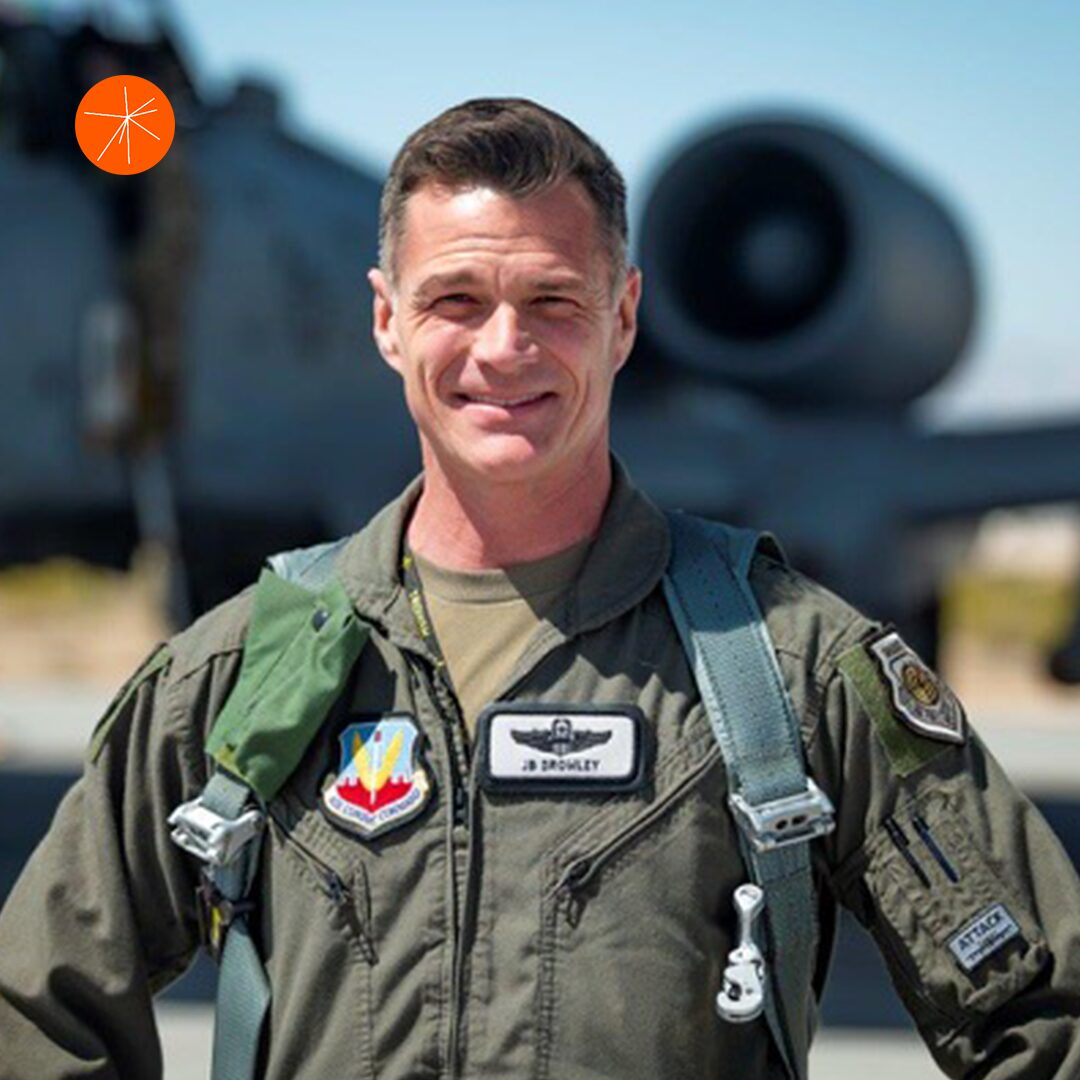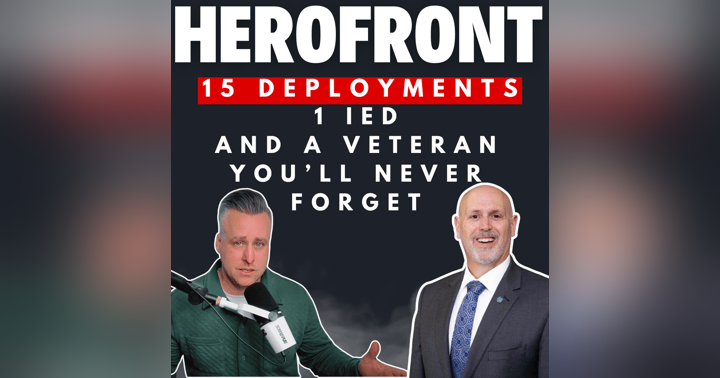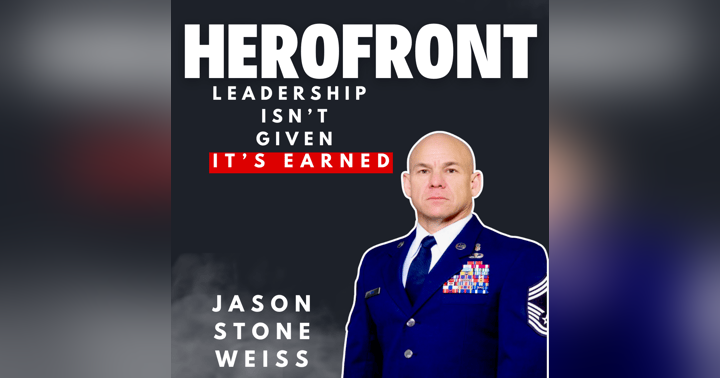Top 5 Self-Development Lessons from Legendary Air Force General - General Mike "Johnny Bravo" Drowley

Top 5 Self-Development Lessons I learned from a Legendary Air Force General - Mike "Johnny Bravo" Drowley
When it comes to leadership, resilience, and growth, few figures embody these ideals as profoundly as General Michael “Johnny Bravo” Drowley. A decorated pilot and revered senior leader, General Drowley has inspired countless individuals through his career and candid insights. In a powerful conversation on the HeroFront Podcast, he shared life lessons that go beyond the military, offering a blueprint for self-development applicable to everyone. From his humble beginnings as a military brat to his rise through the ranks, this decorated pilot shares his remarkable journey - from navigating the (literal) fog of war in the A-10 Warthog in combat missions to leading at the highest levels of the Pentagon. Discover the leadership lessons he learned under fire and the mental resilience he developed in combat. Hear how his chance encounter with leadership expert Simon Sinek shaped his approach to guiding airmen, and learn why the brotherhood of ground and air forces is so insanely vital to mission success.
Here are five transformative lessons we can all learn from this extraordinary leader, but if you'd like to hear my full interview with him, you can watch it here on Spotify: https://open.spotify.com/episode/1p8WimvXfTgpvDlXxSjUMm?si=sDJG20hKR0aMJIzWrPwV7Q
1. Why Your Story Can Change Lives (Even If You Don’t Seek the Spotlight)
True leadership is marked not by personal accolades but by uplifting others—a philosophy embodied by General Drowley. Despite his storied career and significant achievements, he remains steadfast in his belief in servant leadership. As he shared during the podcast, prioritizing the team and mission over personal recognition is what creates trust, collaboration, and a legacy of positive impact.
One of the defining moments in General Drowley’s journey was his encounter with Simon Sinek while he was receiving a base tour. Sinek, seeking stories of profound sacrifice for his next book, heard about Drowley’s harrowing mission and approached him to share his experience. Drowley initially hesitated to share his story and to participate in the TEDx event he was invited to, expressing discomfort with the idea of speaking about himself. “That’s kind of what our community does not like to do,” he explained. “We like to highlight how we help out the team… but we don’t like to highlight our own participation.”
Sinek’s insight reframed Drowley’s perspective: sharing his story wasn’t about self-promotion but about showcasing the extraordinary sacrifices made by his team and inspiring others to embrace selflessness.
"This isn’t about you; this is about everybody else," Sinek told him.
Drowley took the stage, and his TED Talk, titled Fates Worse than Death, became a touchstone for many with over 2M views, illustrating the power of humility and teamwork in the face of immense pressure and how it resonates deeply with many listeners.
Reflecting on the impact of his talk, Drowley recounted moments when young aviators approached him, inspired to follow in his footsteps. “It was really humbling… the fact that it helped a couple of them say, ‘This is something I want to do, and I want to be that someday,’ meant a lot.”
Drowley’s story highlights that servant leadership is not just a principle but a practice. By consistently putting the mission and others above himself, he built a foundation of trust that became vital during combat. As he noted, these relationships were essential: “When the enemy attacked, I had to put my entire life in their (Ground Forces) hands to get through it. We trusted each other.”
Takeaway
Embrace humility and ask yourself: How can I help others succeed? As General Drowley demonstrates, great leadership is about serving others, fostering trust, and inspiring those around you to rise to the occasion when it will inevitably happen.
2. Build Mental Resilience: It’s a Superpower
Combat tests not just the body but the mind. General Drowley emphasizes that resilience comes from shifting focus outward during moments of extreme stress, whether in combat, public speaking, or other high-pressure situations.
“When I’m in those moments, there’s a lot of ‘I’ bouncing around in my head,” Drowley explains. “‘I’m worried about this. I may screw up. I may catastrophically fail.’ What I try to remember is: don’t think about yourself. Think about the team. How do I help them out? How do I deliver?”
This mindset, which he calls in extremis leadership, helps him process high-stakes situations by reframing his fears into a mission to support others. “When I change the script in my mind from thinking about myself to thinking about something bigger than myself, I can deliver in those moments,” he adds.
Takeaway: Life will throw challenges your way. Cultivate mental toughness by acknowledging your struggles and shifting your focus to the bigger picture. Whether it’s helping your team or delivering a meaningful message, thinking beyond yourself can transform fear into strength. You don't have to do it alone.
3. Be a Lifelong Learner
Stagnation is the enemy of progress, and for General Drowley, learning has been the foundation of his extraordinary career. From his early days at the Air Force Academy to leading operations and developing strategies at the highest levels, his journey is a testament to the transformative power of continuous growth.
Reflecting on his journey, Drowley shared, “I’ve been unbelievably fortunate to learn from some amazing leaders throughout my career. The instructors and cadre I worked with were phenomenal, and I constantly borrowed their leadership techniques and ways of thinking.”
His time at institutions like the Air Force Academy, the Weapons School, and National Defense University sharpened not just his technical skills but also his leadership style, critical thinking, and strategic vision.
Drowley emphasized how pivotal moments—like attending the Air Force Weapons School, which he likened to “Top Gun but for the Air Force”—shaped his approach to learning and leadership. “The Weapons School is so much more than tactics. It’s about leadership development and critical thinking. It forced me to reflect on the leader I wanted to be and the person I wanted to become.”
Even now, as the commander at the Air Force Operational Test and Evaluation Center, Drowley’s curiosity drives him.
“AFOTEC has been an incredible experience. Every day I’m learning from this tight-knit, talented team. They’ve been unbelievably empathetic and focused on getting me smart, which isn’t easy—I’m a hard learner,” he joked.
Drowley’s commitment to learning extends beyond the classroom. Whether it’s gaining operational insights during deployments, navigating the complexities of test programs, or studying strategy and policy, he credits his growth to being open to new ideas and surrounding himself with exceptional people.
Takeaway: Whether it’s through reading, mentorship, or hands-on experience, never stop learning. Growth starts where comfort ends, and the pursuit of knowledge can lead to opportunities and connections you never imagined. As Drowley’s story proves, embracing lifelong learning is not just a path to success but a foundation for impactful leadership. Better has no finish line.
4. Forge Meaningful Connections: Lessons in Leadership from Combat
No leader succeeds alone. General Drowley’s story offers powerful insights into how meaningful connections and mentorship drive professional and personal growth. Reflecting on his time flying the A-10 in support of ground operations, Drowley emphasized the importance of selflessness and teamwork:
“The things that we’re doing, it’s not about us. It’s about supporting either a team on the ground, a pilot that may be in need of rescue, and those types of things. That’s what the A-10 stands for… to provide for either teams, units, or maneuver forces on the ground.”
In one mission during Operation Enduring Freedom, Drowley faced complex and dynamic challenges, including poor weather, limited navigation tools, and intense combat conditions. Despite these obstacles, he successfully engaged hostile forces and safeguarded a convoy of Special Forces. He attributes this success to rigorous training, preparation, the leadership lessons instilled by his mentors, and his relationships with this teammates.
“Everything that I had been through, training-wise… it paid off in that moment. Those things that we do, we don't do it for us, but to support something bigger than ourselves.”
This mission also marked the touchpoint of his relationship with Simon Sinek, whose guidance profoundly shaped Drowley’s leadership journey. The connection between their shared values of service and leadership became a foundation for growth and reflection and they remain close friends to this day.
Drowley’s experience underscores the importance of surrounding yourself with people who challenge you, provide clarity in moments of crisis, and reinforce a purpose larger than individual success. Whether in combat or the corporate world, leaders thrive when they lean on a network of like-minded, supportive individuals.
Key Takeaway for Professionals: Invest in relationships that challenge and uplift you. Success is rarely achieved alone—mentors, teammates, and leaders play a vital role in shaping your ability to rise to challenges and support others in meaningful ways.
5. Adaptability is Your Edge for thriving Under Pressure: Leadership, Resilience, and the Power of Reflection
In today’s fast-paced, unpredictable environment, flexibility and adaptability are critical traits that set leaders apart. General Drowley’s leadership journey exemplifies how staying agile—whether navigating combat scenarios or personal challenges—can be a powerful asset for long-term success.
Much like many in the military, especially in the pilot community, there is often an instinct to push through hardship, compartmentalizing stress and trauma. The mindset is simple:
“Let me get through this, and I’ll worry about it later.”
General Drowley shares how this approach, while effective in the short term, can be dangerous in the long run. In the high-pressure environment of combat or critical missions, compartmentalization is vital—it helps you focus on the task at hand, despite overwhelming challenges. But, as General Drowley notes, there’s a risk if you don’t address what you’ve bottled up once the mission is complete. Over time, those stored emotions can catch up to you, manifesting in unhealthy ways.
"You know, a lot of our airmen have been in combat. A lot of our airmen have had to make those type of decisions and execute those type of things. And so I've always looked at it as, hey, what can I pass along with what I've learned at from being in that situation. So that way, the next time we are in combat, the next time we are in those type of circumstances, I can pass those lessons on how to navigate within it and learn from it, and then how to recover from it, when it's all done, and trying to be an example."
Drowley said, reflecting on his own experiences. “The key is taking that step to work through it—to talk about it, to make sure you’re okay.” Whether it’s after a stressful combat sortie or navigating personal adversity, taking time to reflect and process is critical.
“There were times when I’d land, holding my brakes, my legs shaking. It was like everything I had tucked away was finally catching up with me. That’s when the real danger comes, when you keep bottling things up.”
Drowley’s leadership emphasizes the importance of adapting and learning from adversity—not just for personal growth, but to help others grow as well. Whether it’s supporting your team in times of crisis or using your lessons learned to help others navigate similar situations, adaptability is key to overcoming challenges and evolving. In both his formal and informal mentorship efforts, Drowley highlights the importance of cultivating connections and networks to foster resilience.
“I think the informal ones help just as much, if not more. It can be the little things, like your fantasy football team. It’s just having that group that you have… those informal networks are just as important as the formal ones.”
For leaders, fostering a supportive environment where others feel comfortable to share and process challenges can make all the difference in long-term success. General Drowley’s experience shows that leading with adaptability requires embracing change, making room for personal growth, and empowering others through open communication and trust.
Key Takeaway: Adaptability isn’t just about adjusting to change; it’s about proactively embracing opportunities to grow and help others do the same. Build a culture of support where vulnerability is seen as a strength, and continuously evolve by leaning on those around you.
What will you do today to become the best version of yourself?
FAQs
1. What is servant leadership, and how can I practice it?
Servant leadership focuses on supporting and empowering others. You can practice it by prioritizing the needs of your team, actively listening, and fostering a collaborative environment. The more you give, the more you get.
2. How do I build mental resilience?
Start by acknowledging stress and seeking healthy outlets like exercise, therapy, or peer support. Embrace challenges as opportunities to grow. Use the easy days to build resilience that will prepare you for the hard days. (That are undoubtedly going to impact us all.)
3. Why is lifelong learning important?
Continuous learning keeps you adaptable and competitive. It broadens your perspective and helps you tackle challenges more effectively. Life changes, and so should you. Otherwise, what's the point?
4. How can I cultivate meaningful connections?
Focus on building authentic relationships. Engage with mentors, mentees, peers, and communities that align with your values and goals. Start by speaking from the heart, then ensure to follow through with action.
5. What does adaptability look like in practice?
Adaptability involves being open to change, learning new skills, and staying calm under pressure. It’s about thriving, not just surviving, in uncertain situations. 'Preparedness' is a trait all good leaders maintain. You can't predict the future, but you can reduce the room for error with being prepared. When "Murphy's Law" happens, you won't have to throw out your whole plan, you can simply switch gears and keep moving forward.








